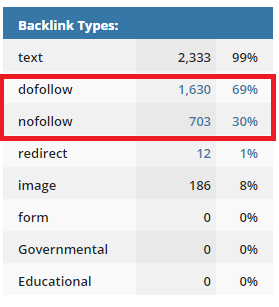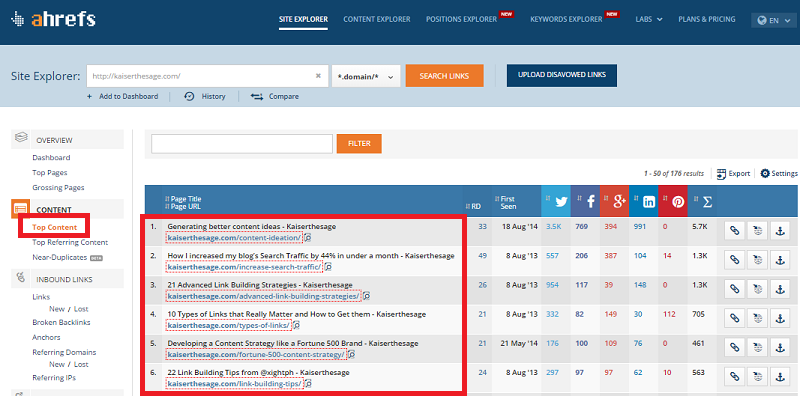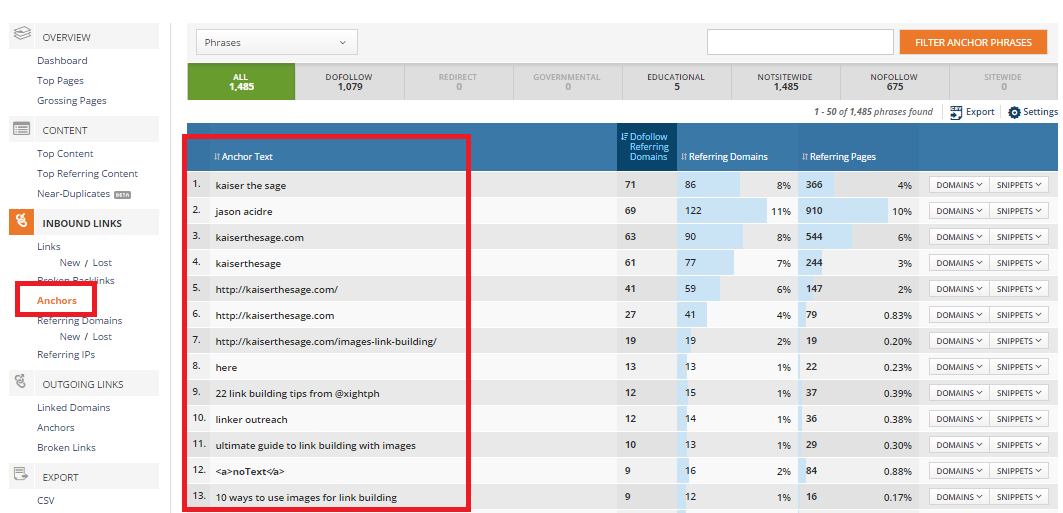by Venchito Tampon Jr | Last Updated on October 24, 2021
Link graph by its definition is the nodes (pages, documents) connected by directed edges (links). It helps in the ranking of documents of specific websites or entities.
Understanding link graph in its basic elements and identifying which existing links need to be improved could had a drastic effect on the site’s overall link and search performance,
It would also impact conversion marketing activities such as email signups from referred visitors on restored links on other sites and additional leads from recovered links on other blog’s broken pages (404).
In this post, I’m going to share with you 6 effective methods on how to improve your existing backlinks – getting the most out of their value and seeing improved results in your search marketing campaigns.
1. Reclaim unlinked branded mentions
Brands with websites that have executed high-par branding performance can potentially draw a good amount of mentions from other relevant websites to the site’s key pages (content or sales page)
You can take advantage of these branded mentions for link development by ensuring that all of them are properly linked to the appropriate pages of your site.
Unlinked branded mentions could be translated to powerful backlinks by reaching out to the site owner or blogger with a sweet and short email.
Here’s an email copy that you can use for linker outreach.
Hi NAME,
I’m Venchito Tampon, marketing coordinator of BRAND NAME.
I reached out to you because I found your site, SITE NAME, including our resource on RESOURCE TOPIC in your page – www.url.com.
I’m wondering if you can give us a credit by inserting a link pointing to our RESOURCE TOPIC content.
Hoping for a positive response.
All the best,
Venchito
A few things to consider in branded link building:
- If branded mentions are acquired through media link building – news release, interviews, round-ups, etc.. – ask the content creator to link out to the brand’s company page or best, your site’s homepage.
- For media link building, you can also ask the webmaster to point your link to your sales page (e.g. link building services) to pass not only link juice to your site’s key pages but also to drive visitors through referral links.
- Take advantage of keyword-specific branded keywords (e.g. curtain blinds) when pursuing links from other sites/blogs. Search for existing blog posts with the exact keyword-specific phrases on the page and try to get a link in them. It does help in sending positive signals to search engines of the relevance of your brand with other websites.
You can check out this guide on Moz detailing how to use unlinked branded mentions for link acquisition.
2. Translate no-follow to do-follow
Attribution to links is not a big issue anymore these days, as whether you built a no-follow or do-follow link, either of the two is qualified to amplify your content, to bring brand awareness and potential conversions to your website.
You can check out these two resources to deeply understand the power of no-follow links:
Though both attributes (no-follow or do-follow) are valuable in brand recognition and link development, one needs to be prioritized as it passes link equity to the site – do-follow.
Translating a no-follow to a do-follow link would work in any of the following cases:
- When a link is built through media purposes (news, round-ups, stories, etc..), you can easily ask the content creator to change the link attribute.
- When the no-follow link pointing to your homepage comes from a high DA website, it is advisable to convert it to do-follow in order to maximize the value from the link, as it would help improve the overall domain authority of your website.
You can find the percentage of dofollow and nofollow links in the backlink types of Ahrefs platform (in case you’re using this tool).
3. Fix linked pages pointing to site’s broken pages
As link building campaign progresses, some links on the linking pages from other sites/blogs dilutes. Others are now pointed to broken pages of your site, which is a lost opportunity to gain new brand followers as well as potential clients/customers who would have seen the information displayed on your broken page.
It is imperative to regularly monitor any broken pages in your website and identify if there are existing links pointing to them.
If inbound links are appropriately point to a similar page of your broken page, then it would help improve your link profile, as referred users could still consume a similar content as they have read when the broken page should have been lived.
There are two options to fix this issue.
Recreate the broken page
You can recover the content on your site’s broken pages by republishing it (only if the information in those pages is still included in your database).
Dive into Archive.org and see if you can recreate the older version of the broken page. Make sure that you produce a more comprehensive information than the original version.
Invest in design. Most of the organic content pieces on the web aren’t originally written by topic experts but through interactive designs and format, the new resource defines a new perspective on the topic.
Once you have published the updated content piece, you can redirect the broken page to its new version, to maintain the link equity passing through the linking pages.
Ask existing linkers to link to a similar page
Another method to sustain link equity from your site’s broken pages is to ask existing linkers to point out instead to similar resources.
You can start by identifying pages that provide similar information to your site’s broken page using top content feature of Ahrefs.
Once you’ve determined similar resources of your broken content piece, you can reach out to its existing linkers and ask them to point their existing links to your updated content piece.
4. Balance anchor text percentage
Anchor text variation is a major discussion in the link building world since Penguin started to roll out on April 24, 2012.
Choosing what anchor texts will be used in every link built/earned is still an issue for most newbie link developers out there, as they want to make their sites’ link profiles as natural looking as possible.
As I always quote on every interview that I’ve been a part of, “don’t make your link profile natural, just be natural”.
If your site’s link backbone has any of the following cases in anchor texts, then you may need to apply link improvement tips (which will be discussed later on):
- Anchor texts aren’t relevant to the domain or page’s topical authority (e.g. finance/loan keywords to a tech blog).
- The volume of commercial anchor texts is greater than the number of branded keywords.
Invest in topical authority content to earn new links and diversify anchor texts
What most seasoned content marketers and link developers would state about the benefits of creating high quality content is simply the ability of a resource to acquire new links for the site, which would help increase the domain’s search performance.
Investing in linkable assets doesn’t just help the brand earn new links. It also helps diversify the anchor texts – commercial keywords and branded texts.
Don’t execute linker outreach to ask for anchor text replacement
If links had been existed for years, then it would be unwise to reach out to the linkers and ask for replacement in anchor texts (changing texts to preferred phrases).
Instead, you can invest your time in improving your existing content to earn more editorial links, which are high in anchor text diversity.
5. Improve content based on its perceived value from existing linkers
Content marketing has always been about delivering substance to readers.
The reason why most bloggers and industry influencers would want to link to you is the perceived value your content brings to the table.
If content’s information is being updated to intersect with the uprising trends and ideas in the industry, there is a likelihood to grow the number of links acquired each month.
Link development involves updating your old or existing content pieces to better serve a specific linkable audience.
A few ways to improve content assets to populate more links for the brand:
- Analyze why linkers linked to you in the first place. Get content improvement ideas from the anchor texts in their linking pages (g. here’s a great list of local job sites from www.domain.com).
- Adding more context on topics that haven’t been made detailed in your content (e. list of job sites on a career improvement content) would help your resource to earn additional contextual links, as it can tap industry-specific blogs (e.g. job search sites).
- Identify industries aside from your main target niche that can be penetrated by your content. You can look at all the inbound links of your resource using Ahrefs.
Other useful resources:
- Creating and Developing Content Assets Like A Pro
- How to Improve the Value and Volume in Content Marketing
6. Make existing linkers link to you again
Recurring links from high authority domains send signals that search engines use as a ranking factor to determine a page’s authority.
Getting a blogger/influencer link to your website again is one effective way to improve your site’s link acquisition process, as you could also drive additional social signals and brand followers to your website.
Here are some ways to generate contextual recurring links from your existing linkers:
- Share content pieces of target bloggers/influencers on your brand’s social media profiles to build rapport with current linkers.
- Reach out to existing linkers and share your newly published content asset (if it’s highly useful, they’ll definitely link to it).
- Create content partnerships with non-competing brands by offering options where both parties would be benefited. You can check out listed options in this post by Jason Acidre on scaling link building process using influencer marketing.
- Demonstrate expertise on high traffic publications by contributing content on a regular basis. This will consistently send qualified traffic and conversions to your site and can also lead to getting invitations to become a regular contributor on other relevant blogs too.
- Build links to content partners’ sites from your contributed content pieces on other industry blogs to facilitate reciprocity (content partners would likely return the favor of linking to your site as well from their guest content pieces).
- Invite linkers to participate in your brand’s online community activities (e.g. webinars, online forums, blog discussions, etc..). There is a high potential to let them link again to your site by featuring you in their new content – tips on XXX webinar.
Useful resources on link improvement:
- Managing Advanced Link Building Campaigns
- Tactical Link Building Insights with Jon Cooper and Brian Dean
If you’re looking for a link building service for your company, you can contact us for inquiry.
The Author
Venchito Tampon Jr
Venchito Tampon is a Filipino Motivational Speaker, Corporate Trainer, and a Leadership Speaker in the Philippines. He is the CEO and Co-Founder of SharpRocket, a link building agency. With a decade of experience, Venchito has a proven track record of leading hundreds of successful SEO (link builidng) campaigns across competitive industries like finance, B2B, legal, and SaaS. His expert advice as a link building expert has been featured in renowned publications such as Semrush, Ahrefs, Huffington Post and Forbes. He is also an international SEO spoken and has delivered talks in SEO Zraz, Asia Pacific Affiliate Summit in Singapore, and Search Marketing Summit in Sydney, Australia. Check out his other businesses, Hills & Valleys Cafe, Blend N Sips and Saas Pursuit.
How our LINK BUILDING AGENCY builds 250 links/mo consistently using Predictable Link Building Methodology™…
- Using a SIMPLE and PROVEN system
- Using a SCALABLE strategy
- No private blog networks
- No creepy outreach emails




